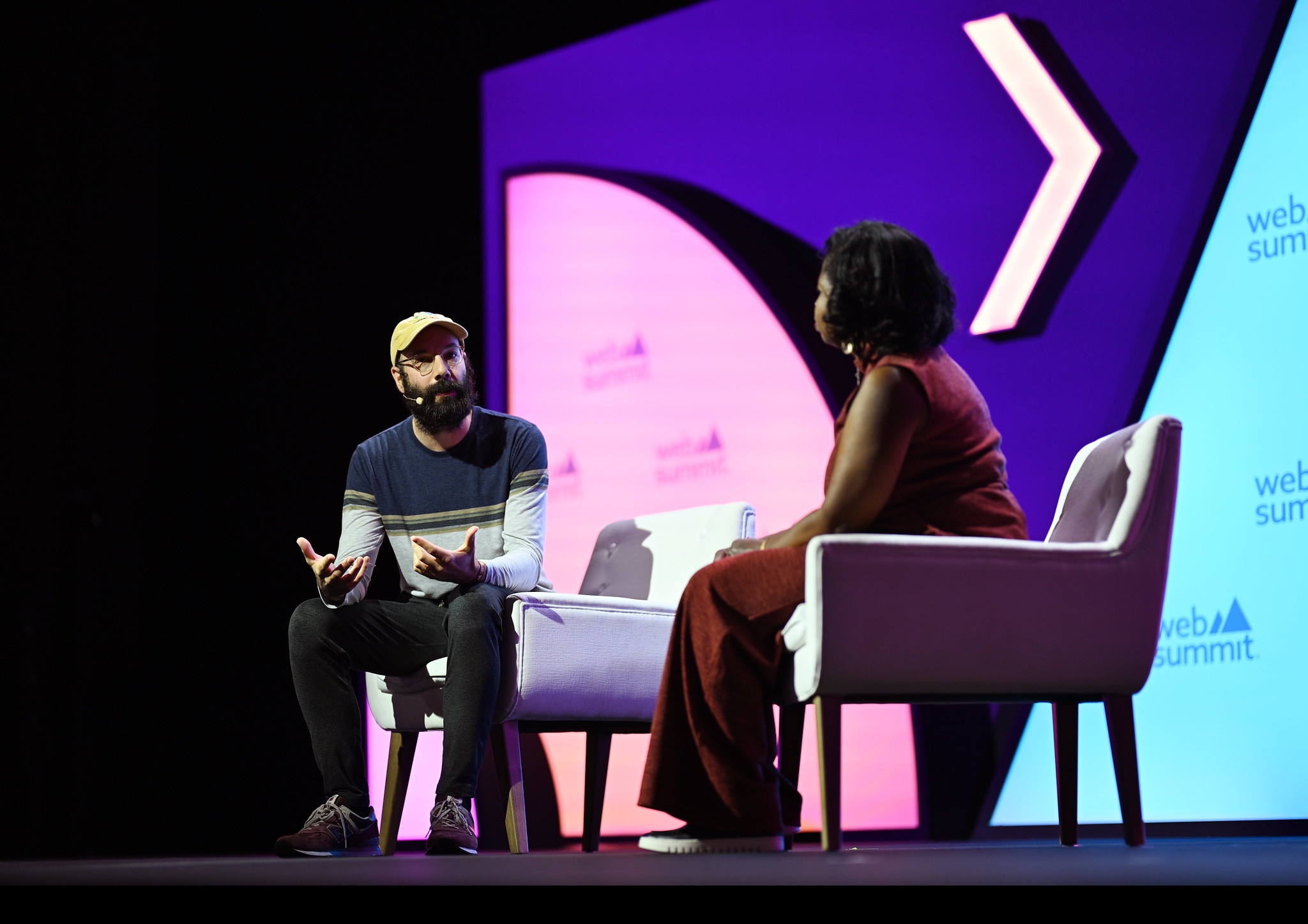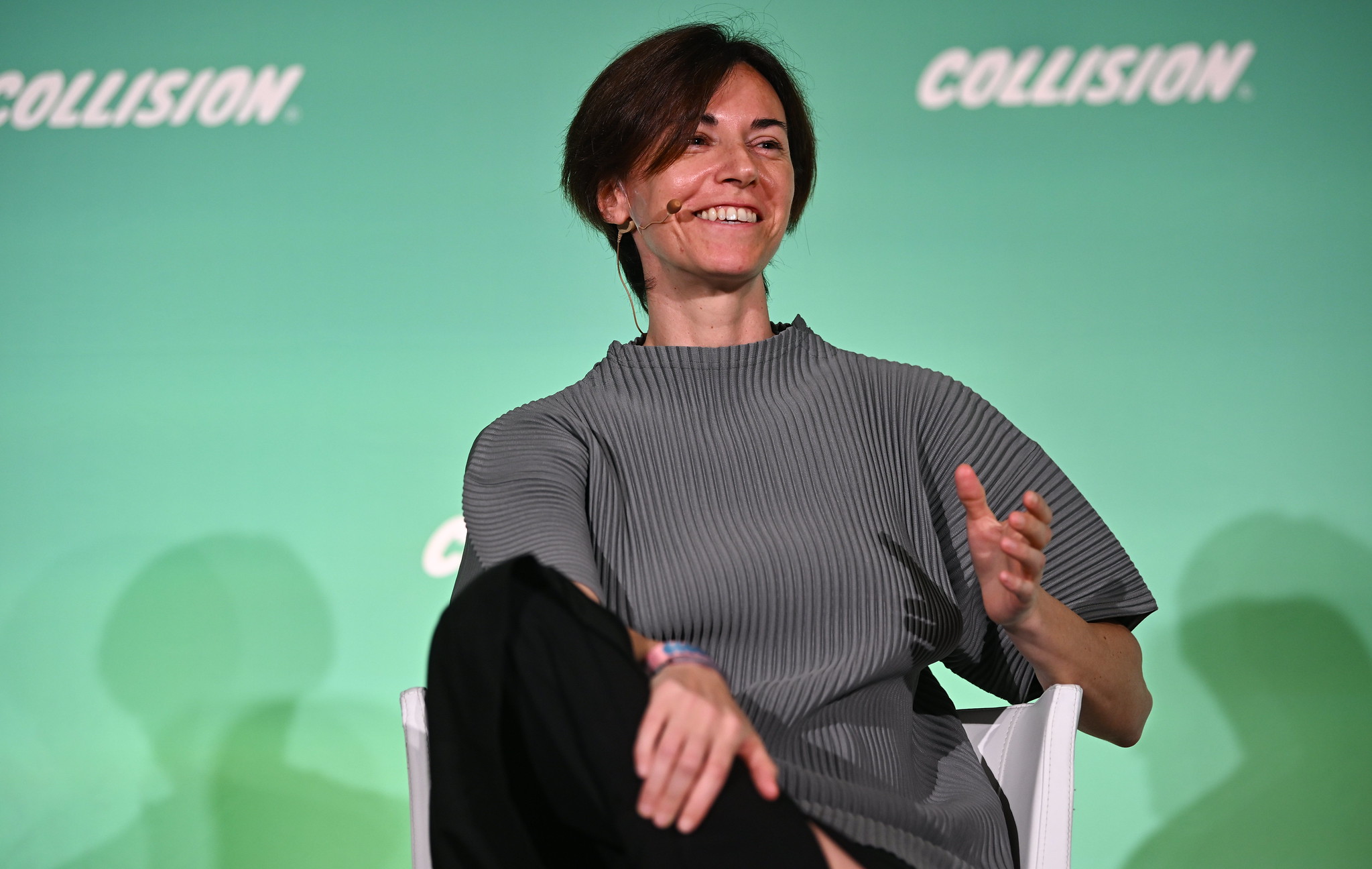
‘If you live up to 120 and you’re not healthy, what’s the point? If your brain doesn’t work, why live that long?’ – Katerina Stroponiati of Brilliant Minds

A leading healthtech entrepreneur has questioned why people would want to live to 120 unless the science is there to ensure their minds and bodies are still working properly.
Katerina Stroponiati (pictured above), founder of Brilliant Minds, told Collision conference that there were many people trying to emulate anti-ageing influencer Brian Johnson, who says his goal is to never die.
Katerina said they were “running like chickens right now, trying to live forever after Brian Johnson and they’re doing, you know, everything out there, which is costly: They take hundreds of supplements, NAD, whatever they hear… which is dangerous, not least besides the cost.”
But Katerina also pointed out that – besides the health risks and costs – longevity had little value if people weren’t also healthy.
“It’s more about life/health span and less about lifespan,’ said the founder. “You know, if you live up to 120 and you’re not healthy, what’s the point? If your brain doesn’t work, why live that long?”
Katerina also suggested that if people are going to live longer, society will have to find new ways to engage them – as ageism is actually causing mental ageing.
“One of the biggest problems that causes brain decline, to cognitively decline, is ageism,” said the founder. “We are going to live longer. Everybody’s working on that. But at the same time, when we get older, like 50, even earlier than that… society asks us to withdraw from it and we feel useless, and then we have mental health issues, depression and Alzheimer’s.”
Katerina was highly critical of those who follow anti-ageing influencers such as Brian Johnson – not least because each human is different and will require a personalised approach.
“Before you start your interventions, you should learn your body: What’s your baseline? Brian Johnson is different. Well, what do I have to do with him? I’m different. I’m a female, different age, different everything. So you can’t follow the same protocol with another individual. That’s wrong.”
The founder also revealed that she was investing in treatments that used devices – including smartphones and screens – to help tackle brain disease. “I invested in a startup, but they’re building the programmable language of the brain. Simply put, what they’re doing is that they create images, and when they project them to you, they rewire your brain.
This technology, which works a bit like watching a movie, can cure mental health issues and diseases like Alzheimer’s, claimed Katerina. “This could be part of your therapy, your brain therapy. This is something that we don’t need to create a new habit [for]. We’re on our screens all day, right? How can we use our devices as medical devices?”
Katerina’s comments were made as part of a wider discussion on human longevity at Collision, where the founder was joined by entrepreneurs Alina Su co-founder and CEO of generation lab, and GlycanAge CEO Nikolina Lauc.
More than 1,600 startups are taking part in Collision 2024 – the highest number of startups ever at a Collision event. 45 percent of these are women-founded, and startups have travelled to Toronto from countries including Nigeria, the Republic of Korea, Uruguay, Japan, Italy, Ghana, Pakistan and beyond.
In total, more than 37,800 attendees have gathered at the event, as well as 570 speakers and 1,003 members of the media, to explore business opportunities with an international audience.
739 investors are attending Collision, including Vinod Khosla, founder of Khosla Ventures; Wesley Chan, co-founder and managing partner of FPV Ventures; and Nigel Morris, co-founder and managing partner of QED Investors, as well as nine companies on the Forbes Midas List, and 12 investors from those firms.
Top speakers at Collision include:
● Geoffrey Hinton, Godfather of AI
● Maria Sharapova, entrepreneur and tennis legend
● Aidan Gomez, founder and CEO of Cohere (an AI for enterprise and large language model company, which raised US$450 million at a US$5 billion valuation in June 2024)
● Raquel Urtasun, founder and CEO of Waabi (a Canadian autonomous trucking company)
● Jeff Shiner, CEO of 1Password (a cloud-based password management tool)
● Dali Rajic, president and COO of Wiz (a cloud security platform)
● Alex Israel, co-founder and CEO of Metropolis (an AI and computer vision platform)
● Jonathan Ross, founder and CEO of Groq (an AI chip startup)
● Keily Blair, CEO of OnlyFans
● Autumn Peltier, Indigenous rights activist
All of our summaries will be published on the Web Summit Summary Service page.
For any questions about this or any other Web Summit Summaries content, please contact us at media@websummit.com.
About Web Summit:
Web Summit runs the world’s largest technology events, connecting people and ideas that change the world. Half a million people have attended Web Summit events – Web Summit in Europe, Web Summit Rio in South America, Collision in North America, Web Summit Qatar in the Middle East, and RISE in Asia – since the company’s beginnings as a 150-person conference in Dublin in 2009.
This year alone, Web Summit has hosted sold-out events in Qatar, which welcomed more than 15,000 attendees, and in Rio, where more than 34,000 people took part. Our events have been supported by partners including the Qatar Investment Authority, Snap, Deloitte, TikTok, Huawei, Microsoft, Shell, Palo Alto Networks, EY, Builder.ai and Qatar Airways.
Web Summit’s mission is to enable the meaningful connections that change the world. Web Summit also undertakes a range of initiatives to support diversity, equality and inclusion across the tech worlds, including Impact, women in tech, Amplify, our scholarship program, and our community partnerships.
Useful links
Collision website: https://collisionconf.com/
Collision media kit: https://collisionconf.com/media/media-kit
Collision images: https://flickr.com/photos/collisionconf
About Web Summit: about.websummit.com

